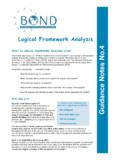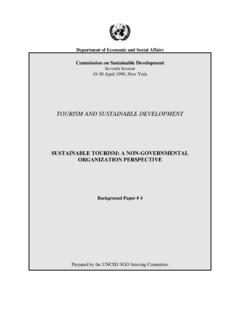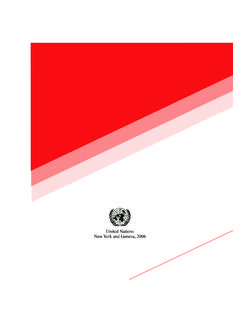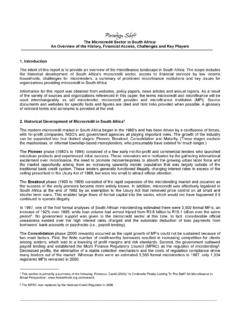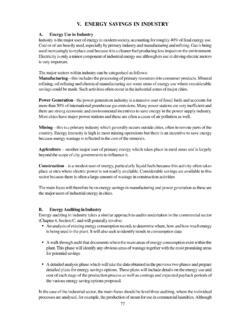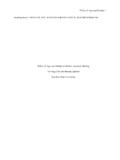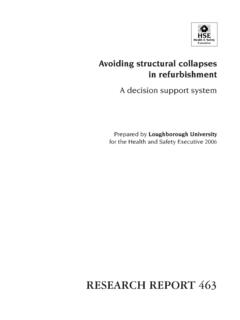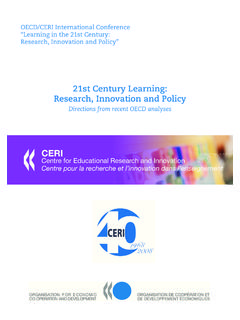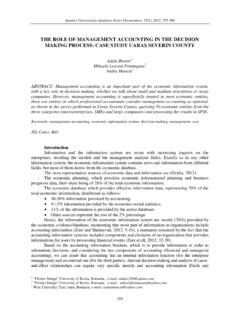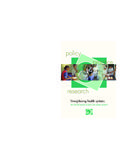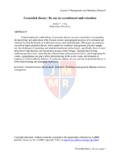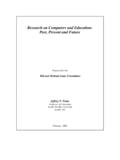Transcription of Expertise and the Policy Cycle - GDRC
1 Expertise and the Policy CyclebyDr. Jack BarkenbusEnergy, Environment, and Resources CenterThe University of TennesseeSeptember 19981 Experts can, and often do, play an important role in environmental decision - making . An understanding ofthis role, however, must be based firmly in the political mileau in which decisions are made. Moreover, areview of the role of Expertise in decision making is enhanced when it is viewed across the entire policyspectrum and not just at one particular point. The purpose of this write-up is to briefly elucidate the role ofexpertise (defined broadly as specialized knowledge and experience) in decision making across the policycycle. As such it provides a mapping context or jumping-off point from which to launch furtherinvestigation of the decision - making scientists devoted to public Policy issues have, since the early 1970s, used a fairly commonheuristic framework to provide conceptual grounding for public- Policy analysis.
2 This framework consistsof discrete phases or stages associated with the Policy process (Anderson, 1978). Some political scientistshave identified as many as seven stages in the Policy process, but the most conventional rendering cites onlyfour. The stages are usually arranged sequentially, as depicted below, and include a feedback Policy CYCLED ecision- making research often focuses exclusively on the Policy formulation stage. This is thepredecision phase that encompasses the steps in the decision - making process set forth by Tonn and Peretz(1998) as (1) identify alternatives, (2) gather and analyze alternatives, and (3) apply a decision tool. It alsois the phase targeted by Dale and English (1998) in their study of decision - making tools.
3 This focus isunderstandable in many respects. If the charge is to improve decision making , one of the most obviousways to do so is to provide decision makers with an understanding of specialized knowledge or expertisethat can assist them in making wise choices among alternatives. Exclusive attention to this phase and thisapproach, however, is negligent in two respects: first, it is based on the unproven assumption that access to2greater Expertise and tools is critical to improving the decision - making process, and, second, that thegreatest gains in decision - making capabilities are to be found in this particular stage of the decision -makingprocess. Unfortunately, some researchers assume that environmental decision makers work in what politicalscientists term a rational man context.
4 This is a context in which the decision makerdispassionately and with unlimited time, resources, and access to information weighs alternativepolicies to find the technical solution that best maximizes public welfare. It is now well-established,however, that this context seldom exists in reality. decision makers usually operate within a tight timeframe with inadequate resources and information. They are buffeted by special-interest pleading,bureaucratic imperatives, and political forces whose vision extends no further than the next election Cycle (Dye, 1984). In such an atmosphere, greater technical Expertise can play a role, but a significantlyconstrained one, at best. By failing to account for this, the researcher runs the risk of becoming irrelevantin the eyes of those whom he/she is trying to assist: namely, the user community that receives its output.
5 Rosenbaum (1998) relates this message precisely, stating, Rational analysis, carried on in an ignorance ofpolitical reality, may well end up so divorced from social reality as to be of little use to anyone. decision makers are acutely aware of the constraints they are under and are keenly cognizant of the factthat technical solutions to problems in the Policy -formulation process are only a part of problem solving. By recognizing this fact, and broadening the scope of the research efforts, future researchers can assist inbuilding the necessary bridge between the culture of the academic community and the very different cultureof the decision following sections provide a preliminary discussion of the role of Expertise in each stage of the policycycle, recognizing the political world in which it exists.
6 It will be shown that Expertise has a role to play ineach stage, but plays a greater role in some of them than others. Examples will be given, when possible, atboth the federal and state Setting3 There is an infinite number of environmental issues that could reach the agenda of decision makers. Political scientists have been quite active in researching the process by which issues gain ascendancy asthey compete for the limited attention of Policy makers (Kingdom, 1984; Dearing and Rogers, 1996;Downs, 1972). The process is not random, but neither is it completely in environmental Policy may believe that science and Expertise play a driving role in agendasetting. By all accounts, however, they do not.
7 Dearing and Rogers (1996) state bluntly that scientificresearch results do not play an important role in the agenda-setting process. Rather, they claim that issuesreaching the attention of decision makers do so on the basis of the social construction of reality, wherebyperceptions count at least as much as reality. The media are seen as key elements in this construction,reaching and influencing a public that is concerned about environmental quality but relatively ignorant ofspecific environmental issues and their causes. Not all media are equal. A headline in The New YorkTimes, for example, will have more influence than one in lesser-known newspapers. Likewise, a segmenton 60 Minutes will have an immediacy and impact greater than that of any print messages.
8 The nature ofevents covered by the media are also important drivers. A catastrophe on the order of the Exxon Valdezbreakup is bound to gain more public and decision -maker attention than the incremental seepage of oil frombackyard automotive oil changes even though the collective environmental insult is greater from the latterthan the former. Certain individuals, , the president or a governor, are also able to get key issues on theagenda by virtue of their public office. While recognizing that experts are seldom the drivers for issues reaching the public agenda, one should notignore the extent to which Expertise is drawn upon to legitimize issue attention. That New York Timesarticle getting the attention of policymakers, for example, will nearly always have a scientific underpinningbased on expert-reporter discussions.
9 The same can be said for initiatives that come out of the executivebranch at both federal and state levels. Hence the fact that scientific Expertise is seldom a driver for agendasetting in the realm of environmental Policy , should not diminish the key role that it plays in the to make science a more powerful driver in this stage of the Policy Cycle have been evident inrecent years. Comparative risk studies at both the federal and state levels have attempted to identify issuesthat have gained little attention (and resources) despite evidence of relatively high risks or environmentalinsults (one of the foremost issues being indoor radon, for example). The basic thinking behind many of4these studies has been that once we carefully identify risks according to their respective magnitudes,attention and resources will shift from low-risk concerns to high-risk the popularity of these studies, there is little evidence to show a restructuring of environmentalpriorities.
10 Speaking specifically about comparative risk studies, Davies and Mazurek (1998) have statedthat they are an excellent tool for identifying problems and defining strategies, but most exercises to datehave not yet resulted in significant changes in the way lawmakers and administrators actually targetresources at environmental problems. Bureaucracies and interest groups have formed around long-standing environmental issues and have resisted attempts to alter environmental priorities. The short-termresults from comparative risk examinations, therefore, have been quite incremental, and the movementremains at the margins of our environmental-protection Environmental Protection Agency (EPA) is beginning to support anticipatory efforts to identify seriousenvironmental problems.

